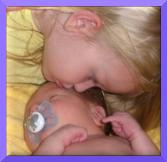Thursday, April 17, 2008
Infant massage provides hands-on nurturing
Parents can take classes to learn proper technique.
By CARINE NADEL
Special to the Register
My baby's fussy. Poor thing, she cries all the time. The
doctor says it's colic.
My wife gets to hold her all the time. What can I do to
bond with my child?
Is there some way for us to help teething pain without over
the counter chemicals?
If this sounds like concerns you've had or heard from someone
close to you, rest assured you're not alone.
There is a natural, wonderful way to see babies through all
of those beginning "snags" and even help them start learning!
Infant massage.
It provides the groundwork for a
lifetime of nurturing through touch. Among the possible benefits: Parents can help
their infant to sleep better; increase their muscle tone and skills; improve digestion (thereby
relieving colic, diarrhea and constipation); relieve teething pain; and bond better with their child.
There are classes dedicated to teaching new parents the importance
of proper infant massage technique. What should a new parent look for?
Mikki Anderson, vice president/ director of holistic services
at StressBusters Body Therapy Center in Laguna Hills and a licensed specialist in the field of both pregnancy and infant massage,
provides some answers.
Q: What
kind of credentials should the teacher/instructor have? How old should the baby?
A: The instructor should be a licensed
professional with over 1,000 hours of training and extra specialized training in the area specifically designed in infant
massage.
Make sure the teacher has been accredited by the International
Association of Infant Massage Trainers. This means they have been through an extensive five-day/40-hour class learning about
the various ways to use an educated and loving touch to help your baby in both emotional
and physiological ways.
As far as when to start – while you can and should start
cuddling and bonding with your infant from the moment of birth – waiting until after the first week (to
begin infant massage class) is best.
Q:
Is infant massage good for all babies?
A: High-needs babies are a bit trickier
to include in this process because of the overstimulation factor. But we will teach the parents how to do a "touch" rather than "rubbing" method, so the same bonding and nurturing occurs.
Q:
Is this a good way to get dads involved in the bonding experience?
A: This is an excellent way to get
the daddies involved. Women who breast feed get to have this closeness by the very nature of the act. Dads don't have this
amount of time (even if they feed a bottle).
So by them using the massage they not only help their baby,
they get to have a good period of time to enjoy a similar closeness.
Q: How
long can parents continue the massages?
A: Most babies are easy to massage
until about 6 months of age, then they start getting quite wiggly. But that doesn't mean the experience has to stop. It just
means that you have to look for ways to distract your baby and do it in shorter bursts.
As an example, a baby or toddler who's sitting can be handed
a favorite toy and while they're looking at it or playing with it, you can massage a foot or shoulder. A couple of minutes
and then you move on.
Q: How
does it help our baby and us develop?
A: The baby gets the much needed nurturing and bonding, as do the parents. But it helps the parents to become more confident in their parenting skills by teaching them to pick
up on the physical cues about what their child is in need of.
Contact the writer: health@ocregister.com
source site: click here

